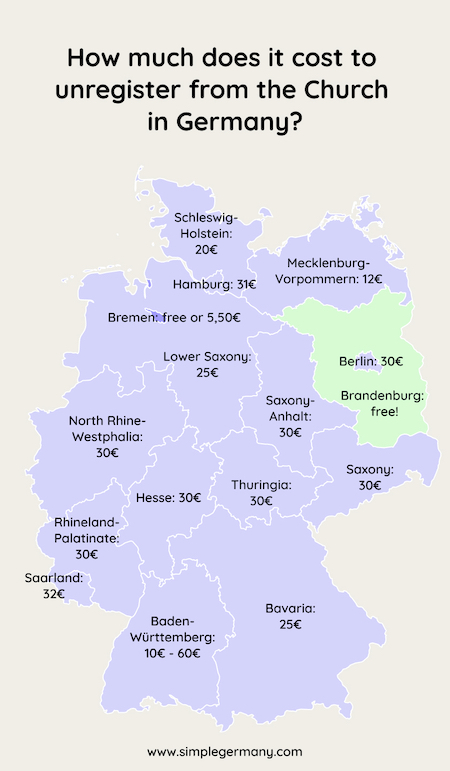Church tax in Germany is not a myth. It is alive and well since 1919. If you are not German, this might be unimaginable. As a Latin American, this for sure was a big surprise for me to find out.
Is there a church tax in Germany? Yes, all German residents are eligible to pay! However, the church tax (Kirchensteuer) only applies to registered Catholics, Protestants, or Jewish. The amount depends on the individual income and on the state the person lives in. Bavaria and Baden-Wurttemberg take 8%, all other states take 9% of your income tax.
In 2022, the Catholic and Protestant churches received 13.09 billion euros from church tax.
TLDR;
If you are Catholic, Protestant, or Jewish and want to be a member of these communities in Germany and be able to use their facilities (for example, to get married), then you need to pay church tax. Here is a list of all the religious communities that pay church tax.
Some states charge 8% and others 9% of your income tax in church tax. You can check how much you need to pay by using this online german church tax calculator. You can unregister from the church and stop paying church tax. This costs around 30 euros and a lot of time (bureaucracy in Germany). You can find details about this process further down in this article.
Do you have to pay church tax in Germany?
Good To Know
If you are living in Germany under the SOFA agreement (military), you don’t have to pay church tax.
If you are a member of a religious community and the public law recognizes it as a corporation, you may need to pay church tax.
The following nine state-recognized religious communities are allowed to collect church tax:
- Evangelical churches
- Catholic churches
- Old Catholic Church
- Jewish religious communities
- Israelite religious communities
- Free religious communities
- Reformed Church of France in Berlin
- Mennonites community in Hamburg-Altona
- Unitarian religious communities in Rhineland-Palatinate
If you are part of any of the following seven religious communities, you do not pay church taxes in Germany:
How does church tax work for expats?
One of the first things you will need to do upon your arrival to Germany is to register in your local government office (Anmeldung) by filling out an official form. In the Anmeldung form, you will have multiple questions regarding religion.
If you are not religious, you should either leave the field blank or use a dash to indicate that it is not applicable. If you are religious, then make sure to specify which religion you have.
The local registration office will forward your information to the Finance Ministery (Finanzamt). Depending on your answers regarding religion, they will proceed to link your tax ID with church taxes or not.
Time for a personal story.
I have an Italian friend who lived in Germany for four years. During his registration process (Anmeldung) in Germany, he marked that he was not religious. Four years after being in Germany, he got an official letter requesting him to pay hundreds of euros worth of German church tax for the Catholic Church. The amount was the total amount he had not paid in the last four years.
After researching, it turns out that the German Catholic Church contacted the Italian Catholic Church and asked if my friend was an official member of the church in Italy. The answer was: ‘yes’.
I suggested to my friend to unregister from the Catholic Church to avoid paying the fine. He explained that his dream was to get married by the church, so if he would unregister in Germany, he would no longer be a catholic in Italy – where he wanted to get married.
He ended up paying for the fine.
The lesson here is: Just because you mark as ‘not religious’ in your Anmeldung, does not mean that you won’t be paying church taxes. If you are a member of the Catholic, Protestant, or Jewish communities in your home country, you might ‘get caught’ in your lie and will have to end up paying anyways.
How do you pay for church taxes?
Church taxes are paid the same way as any other tax in Germany. Your salary slip will have an extra line indicating how much your church tax was for that month.
If you are curious about how much you would end up paying, you can calculate it with the help of this German church tax calculator.
How do I leave the church in Germany – Your guide to get through the bureaucracy
As with any German process, you will need to jump through bureaucratic hoops, invest some time, and have a lot of patience.
Most people leave the church because they want to stop paying church tax. The price and the process depend on the state you live in.
In some states, like in Brandenburg, you can unregister for free. The most expensive state to unregister from the church is Saarland, at 32 euros.

Regarding the process, some states, like Bremen, allow you to unregister directly with the church for free. Other states, like Northrhein-Westfalia, require you to go to the court or a notary to complete the process.
For more information on the price and the process, to unregister from the church, make sure to check out the Kirchenaustritt (leave the church) website. The information is only available in German, but if you use Chrome’s ‘Translate to English’ feature, you should be able to find all the information you need in English.
Even though this might seem like a bureaucratic mess, which it is, don’t despair. All the expats living in Germany have had the same questions we answer on this site. Germany is an awesome country to live in, so power through! The grass is greener on the German side.





